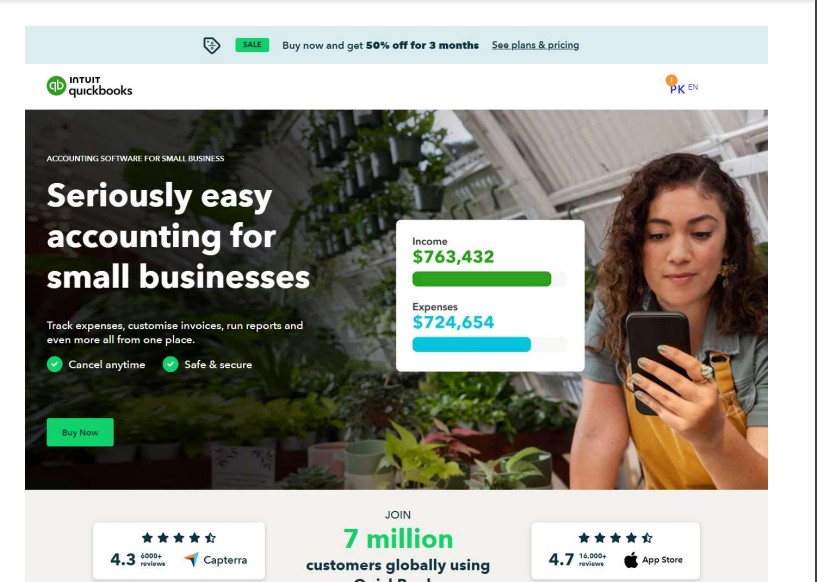The Complete Guide to Launching and Growing a Freelance Bookkeeping Business
Key Highlights
- Freelance bookkeeping is gaining traction in today’s economy, offering flexibility and the chance to build a thriving business.
- Essential competencies for freelance bookkeepers include proficiency with accounting software, meticulous financial record-keeping, and strong client relationship management.
- Setting up your own bookkeeping business involves strategic planning, effective marketing, and utilizing the right tools like QuickBooks to streamline operations.
- The growing trend of virtual bookkeeping opens up new avenues for remote work and global clientele.
- Strategic marketing and networking are crucial for attracting clients and ensuring a stable income stream.

The Evolution of Freelance Bookkeeping in the Modern Workforce
Transforming Employment with the Gig Economy
The gig economy has reshaped traditional employment by offering professionals the chance to work on their terms as independent contractors or consultants. This shift has been particularly beneficial for fields like bookkeeping, where the work can be done remotely and on a flexible schedule. As more businesses, especially smaller ones, look for cost-effective ways to manage their finances, the demand for freelance bookkeepers has increased significantly.
Freelance work has become an attractive option for many, allowing them to work independently and choose projects that align with their expertise. This is especially true for bookkeeping, where tasks such as financial record-keeping, invoicing, and payroll management can be efficiently managed on a freelance basis. The rise of remote bookkeeping services has made it possible for bookkeepers to work with clients worldwide, expanding their opportunities and client base.
The Appeal of Freelancing for Bookkeepers
Freelancing offers numerous advantages, including the freedom to set your rates, choose your clients, and work from anywhere. Freelancing Guide For bookkeepers, this means offering virtual bookkeeping services that cater to the needs of businesses that prefer outsourcing their financial management. As a freelance bookkeeper, you can customize your offerings to suit the needs of small businesses, startups, and entrepreneurs, creating a niche market for yourself.
The flexibility of freelancing like on fiverr by make a gig is a significant draw, but so is the potential for higher earnings. Freelance bookkeepers can command premium rates for specialized services like tax preparation, financial analysis, and payroll management. By diversifying your client base, you reduce the risk of relying on a single income source and can create a more stable and lucrative career.
Some benefits of freelancing are:
- Diverse Projects: Work on various projects to expand skills.
- Location Freedom: Work from anywhere with an internet connection.
- Higher Earning Potential: Set rates and potentially earn more.
- Continuous Learning: Stay updated on industry trends.
- Networking Opportunities: Build connections with clients and peers.
- Reduced Expenses: Save on commuting and office costs.
- Personal Growth: Develop self-discipline and time management.
- Job Satisfaction: Choose projects aligned with interests.

Establishing Your Freelance Bookkeeping Business
Crucial Skills for Freelance Bookkeepers
To thrive as a freelance bookkeeper, you need a strong grasp of key accounting principles and the ability to use relevant software tools. Essential skills include:
- Proficiency with Accounting Software: Familiarity with tools like QuickBooks, Xero, and FreshBooks is crucial for managing client accounts efficiently.
Detailed Financial Record-Keeping: Keeping accurate and organized records is essential for tracking expenses, managing cash flow, and ensuring compliance with tax laws.
Client Communication and Relationship Management: Building and maintaining strong relationships with clients requires excellent communication skills and the ability to manage multiple accounts simultaneously.
In addition to these skills, freelance bookkeepers should be adept at financial forecasting and analysis. These skills enable you to offer clients valuable insights into their business’s financial health, helping them make informed decisions. Payroll management is another critical area, particularly for clients with employees, where accurate wage calculation and timely payment are essential.
Steps to Start Your Freelance Business
Launching a freelance bookkeeping business involves several key steps:
- Business Registration: Choose a name for your business and ensure it’s registered. Depending on your location, you may need to obtain specific licenses or permits.
- Setting Competitive Rates: Research local rates for freelance bookkeeping services to determine how much to charge. Consider your experience, the complexity of the work, and the level of service you offer when setting your rates.
- Investing in the Right Tools: Selecting the right accounting software, such as QuickBooks, is vital for streamlining your workflow and ensuring you can efficiently manage your clients’ financial records.
- Building a Professional Website: Your website should clearly outline your services, rates, and contact information. Consider including a blog or resource section to attract potential clients and demonstrate your expertise in freelance bookkeeping.
When establishing your rates, consider offering different pricing tiers to accommodate various clients. For example, you might have a basic package for startups that includes expense tracking and invoicing and a more comprehensive package that covers financial analysis and tax compliance. This allows you to serve a broader range of clients and maximize your revenue potential.
A few excellent websites provide in-depth freelance bookkeeping courses and valuable resources for aspiring bookkeepers.
Streamlining Your Workflow with Bookkeeping Software
Mastering Essential Tools Like QuickBooks
QuickBooks Online is a popular choice among freelance bookkeepers due to its user-friendly interface and robust features. Mastering this software can significantly enhance your efficiency and productivity. Key features include:
Tracking Expenses: Monitor and categorize expenses to help clients manage their budgets effectively.
Invoicing: Create and send professional invoices, track payments, and manage accounts receivable efficiently.
Payroll Management: Handle payroll processing, including wage calculation, tax preparation, and pay disbursement.
Generating Financial Reports: Produce financial statements and reports to provide clients with insights into their financial health.

Other accounting tools to consider include:
- Xero: Known for its intuitive interface and seamless integration with third-party apps, Xero is an excellent option for small business clients.
- FreshBooks: This software is ideal for freelancers and small businesses looking for an easy-to-use invoicing and expense tracking solution.
- Wave: A free accounting tool that offers essential features like invoicing, receipt scanning, and financial reporting, making it a great option for startups.
Maximizing Efficiency with Automation
Efficiency is key in freelance bookkeeping. Leveraging tools like QuickBooks allows you to automate routine tasks, such as invoicing and expense tracking, which saves time and reduces the risk of errors. This automation enables you to focus on more strategic aspects of your business, such as client acquisition and relationship management.
For instance, setting up recurring invoices for clients with ongoing services can save time and ensure you receive payments on time. Similarly, automating expense tracking by linking clients’ bank accounts and credit cards to your accounting software allows for real-time updates and more accurate financial records.
Why Virtual Bookkeeping is a Perfect Fit for Freelancers
Expanding Your Client Base
Growing your client base is essential for sustaining a successful freelance bookkeeping business. Here are some strategies to consider:
- Networking: Join professional organizations, attend industry events, and connect with potential clients on platforms like LinkedIn.
- Enhancing Your Online Presence: Regularly update your WordPress website, blog about relevant topics, and engage on social media to attract potential clients.
- Leveraging Referrals: Encourage satisfied clients to refer others to your services. Offering incentives like discounts or free consultations can help generate more referrals.
Creating case studies and success stories based on your work with previous clients can serve as powerful testimonials. These can be used in your marketing materials to highlight how you’ve helped clients save money, streamline their processes, or improve their financial reporting.
Ensuring Steady Income
Maintaining a steady income stream can be challenging in freelance bookkeeping. To achieve this, consider the following:
- Diversify Your Service Offerings: Offer a range of services, such as tax consulting, payroll management, and financial analysis, to attract a broader client base.
- Secure Long-Term Contracts: Establish retainer agreements with clients to provide a predictable income stream.
- Upsell Additional Services: Offer existing clients additional services, such as budgeting and cash flow management, to increase your revenue.
Another effective strategy is to offer bundled services or package deals. For instance, you could offer a “tax season package” that includes tax preparation, financial reporting, and compliance services at a discounted rate. This not only provides value to your clients but also helps secure more work during peak seasons.
The Perks of Remote Bookkeeping
One of the greatest advantages of virtual bookkeeping is the flexibility it offers. As a remote bookkeeper, you have the freedom to work from anywhere, whether at home, in a co-working space, or while traveling. This flexibility allows you to create a better work-life balance, as you can set your hours and take on as much or as little work as you desire.
Remote work also expands your potential client base. You’re no longer limited to local clients and can offer your services to businesses worldwide. This can be especially beneficial if you specialize in a specific industry, allowing you to target clients in that niche regardless of their location.
Maintaining a Healthy Work-Life Balance
Achieving a work-life balance is essential for avoiding burnout and maintaining long-term success. Here are some tips:
- Set Clear Boundaries: Establish specific work hours and stick to them to create a separation between work and personal life.
- Prioritize Self-Care: Take regular breaks, exercise, and engage in activities that help you recharge.
- Outsource When Needed: If your workload becomes overwhelming, consider outsourcing tasks like data entry or invoicing to focus on higher-value activities.
Building a support network of other freelancers or joining a co-working space can also help you stay motivated and connected. Regularly interacting with others in your field can provide valuable insights, reduce feelings of isolation, and help you stay up-to-date with industry trends.
Promoting Your Freelance Bookkeeping Business
Crafting a Strong Online Presence
A robust online presence is crucial for attracting clients in today’s digital world. Here’s how to build and optimize your online presence:
- Professional Website: Develop a website that clearly communicates your services, showcases your expertise, and includes client testimonials. Ensure it’s SEO-optimized with keywords like “freelance bookkeeping,” “virtual bookkeeping,” and “remote bookkeeper.”
- Blogging: Regularly post content relevant to your target audience, such as “getting started as a freelance bookkeeper” or “tips for successful bookkeeping.” This will establish you as an authority in your field and boost your website’s SEO.
- Social Media Engagement: Utilize platforms like LinkedIn, Twitter, and Facebook to share your content, connect with potential clients, and participate in industry discussions.
Video content is also a powerful way to demonstrate your expertise. Consider creating videos on topics like using QuickBooks, managing cash flow, or addressing common financial challenges for small businesses. These can help you engage with your audience and stand out from the competition.
Strategic Networking for Client Acquisition
Networking is essential for growing your freelance bookkeeping business. Consider these approaches:
- Join Professional Associations: Becoming a member of organizations like the American Institute of Professional Bookkeepers (AIPB) or the National Association of Certified Public Bookkeepers (NACPB) can provide networking opportunities and enhance your credibility.
- Attend Industry Events: Participate in conferences, seminars, and webinars related to bookkeeping, accounting, and small business management.
- Engage with Online Communities: Join online forums, social media groups, and discussion boards where small business owners and entrepreneurs seek financial advice.
In addition to traditional networking, consider partnering with other professionals, such as accountants, financial advisors, and business consultants. By forming these partnerships, you can refer clients to each other and expand your network.
Addressing Freelance Challenges and Finding Solutions
Handling Irregular Income and Client Expectations
Managing irregular income is one of the common challenges in freelancing. To mitigate this, you should:
- Build an Emergency Fund: Set aside a portion of your income to cover expenses during slower periods.
- Set Clear Expectations: Communicate effectively with clients about project timelines, deliverables, and payment terms to avoid misunderstandings.
- Invoice Promptly: Send invoices immediately after completing work to maintain a steady cash flow.
Offering payment plans to clients who may find it challenging to pay large invoices upfront can also help maintain cash flow while making your services more accessible.
Overcoming Common Freelance Obstacles
Freelancing comes with its own set of challenges, such as isolation, time management, and self-discipline. Here are some strategies to overcome these obstacles:
- Stay Organized: Use project management tools like Trello or Asana to keep track of deadlines, client communications, and tasks.
- Continue Learning: Stay updated with the latest industry trends, software updates, and best practices by taking courses and attending workshops.
- Seek Support: Join freelancer groups, both online and offline, to connect with others who understand the unique challenges of freelancing.
Conclusion and The Future of Freelance Bookkeeping
Freelance bookkeeping offers a rewarding and flexible career path for those with the right skills and mindset. The future of this field is bright, with growing demand for virtual bookkeeping and remote bookkeeping services. By continuously improving your skills, staying updated with industry trends, and effectively marketing your services, you can build a successful freelance bookkeeping business that provides value to clients and offers a fulfilling work-life balance. If you want to learn more about freelancing click this link. Read more freelancing guide from here.
FAQ
What is freelance bookkeeping?
What jobs can you get with a bookkeeping certificate?
A bookkeeping certificate opens the door to various roles such as freelance bookkeeper, self-employed bookkeeper, bookkeeping consultant, accounting technician, or payroll clerk. You can also offer specialized services like tax preparation, financial analysis, and budgeting.
How do you start a bookkeeping job with no experience?
To start a bookkeeping job with no experience, focus on gaining relevant skills through online courses, certifications, or internships. Offering your services at a lower rate initially can help you build a portfolio and gain client testimonials.
What bookkeeping software is best for freelancers?
QuickBooks Online is widely considered the best bookkeeping software for freelancers due to its user-friendly interface, comprehensive features, and cloud-based accessibility. Other options include Xero, FreshBooks, and Wave.
What types of accounting projects (e.g., bookkeeping, tax preparation, financial analysis) are currently posted on Upwork/Fiverr/Freelancer?
- Bookkeeping: Daily transactions, invoicing, expense tracking, bank reconciliation.
- Tax Preparation: Individual, corporate, or sales tax returns.
- Financial Analysis: Creating financial statements, budgeting, forecasting, and financial modeling.
- Payroll Processing: Calculating wages, deductions, and tax withholdings.
- Accounting Software Setup: Implementing accounting software (QuickBooks, Xero, etc.).
- QuickBooks Support: Troubleshooting, data entry, and report generation.
- Financial Reporting: Creating income statements, balance sheets, and cash flow statements.
For more information:
For more in-depth learning:
- Subscribe to YouTube channel youtube.com/free freelance bookkeeping/course for comprehensive courses.
- Join Facebook page facebook.com/freelance bookkeeping/guide and work for updates and community interaction.